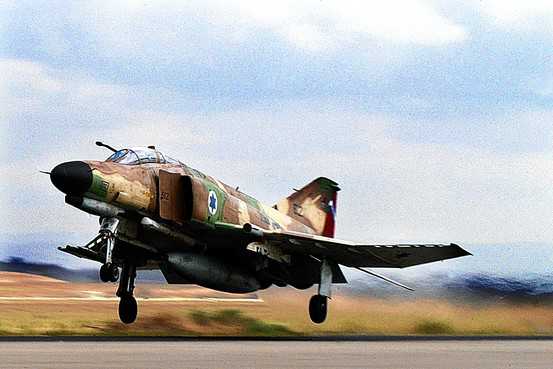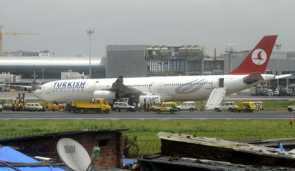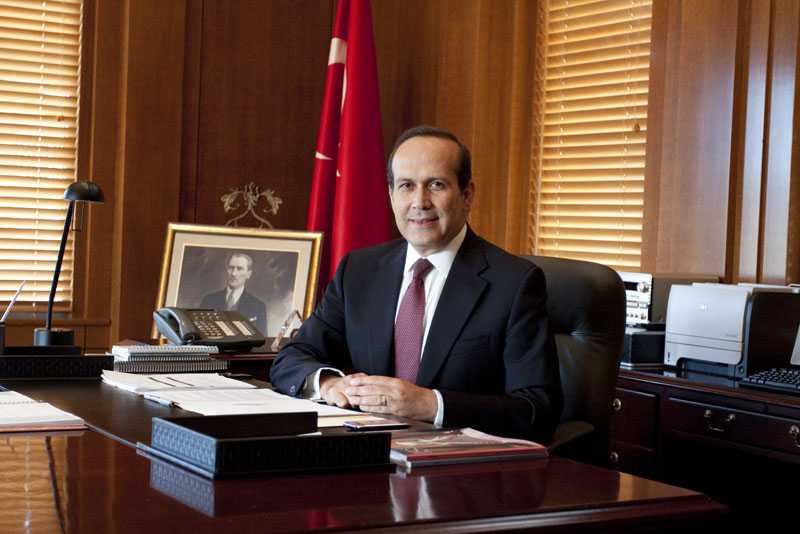Turkey Suspends Defense Trade With Israel
Erdogan Says More Penalties Coming, As U.S. Seeks to ‘De-Escalate’ Crisis

Agence France-Presse / Getty Images
F-4 Phantom jet (Israeli-flagged version)
ISTANBUL—Turkey’s Prime Minister Recep Tayyip Erdogan said Tuesday that his country was suspending defense trade with Israel and that Turkish naval vessels would be seen in the eastern Mediterranean more often, as Ankara ratcheted up pressure in a rising dispute with its former ally.
Speaking to reporters in Ankara after giving a speech at the Ankara Chamber of Commerce, Mr. Erdogan said the suspension of military agreements with Israel, which Turkey had previously announced, would include trade in defense goods.
“Trade relations, military relations, defense industry—these we will suspend. These will be completely frozen and that process will be followed also by very different sanctions,” he said.
He said the measures still to come would be a “Plan C” to the “Plan B” already announced.
Turkey said Friday it was downgrading diplomatic relations with the Jewish state in response to Israel’s continued refusal to apologize for the killing by Israeli commandos of eight Turkish citizens and one Turkish-American on board the Mavi Marmara aid ship, as it sought to break Israel’s blockade of the Gaza Strip in May last year.
As the rift deepens between Israel and Turkey, two of the U.S.’ most important Middle East allies, the Obama administration said Tuesday it was moving to “defuse” the crisis.
“We are concerned about the state of the relationship,” State Department spokeswoman Victoria Nuland told reporters Tuesday. “We have over many months tried to work with our ally Turkey and our ally Israel to strengthen and improve their bilateral relationship. We still believe that getting back to a good partnership between them is in each of their interests, and we will continue to work for that goal with both of them.”
Turkey has announced no general trade sanctions against Israel. A spokesman for Mr. Erdogan said the prime minister had been referring in his remarks Tuesday only to trade in defense goods, and not to trade in general. On Monday, Turkey’s economy minister had said there would be no broader trade sanctions “for now.”
The office of Israeli Prime Minister Benjamin Netanyahu declined to comment Tuesday. Other Israeli officials contacted said privately that they don’t wish to engage Mr. Erdogan in a public debate so as not to be seen as further aggravating political ties.
The Way They Were
Some key sales by Israel to Turkey during times of strong military ties:
1995: Upgrade of 54 U.S.-made F-4 Phantom jets with new avionics systems; $630 million.
1997: Upgrade of 48 U.S.-made F-5 light fighter jets with new avionics systems; $75 million.
2002: Upgrade of 170 U.S.-made M-60 A1 battle tanks to refurbish engines and fit larger 120mm canons, fire-control systems and advanced armor protection; $668 million.
2005: Agreement for sale of 10 Heron UAVs, unmanned aerial vehicles that can fly for 24 hours at up to 25,000 feet. Delivered in 2010; $180 million.
*Note: Figures are approximate, as reported at the time the deal was signed.
Source: WSJ Research
Zalman Shoval, a former Israeli ambassador to the U.S. who works with the Israeli government, called Mr. Erdogan’s comments part of Turkey’s “childish” reaction to the United Nations report released last week that stated the Gaza blockade was justified but that Israel’s use of force was “excessive and unreasonable.”
Turkey and Israel had nearly $3.5 billion in overall trade in 2010, according to official Turkish figures, a record reached during a sharp downturn in the political relationship. Moreover, trade rose more than 25% in the first half of this year, compared with the same period last year, Israeli and Turkish figures show.
Separate data for defense-related trade weren’t available. Past major deals, however, included an agreement worth an estimated $600 million to $700 million under which Israel modernized Turkey’s aging Phantom F-4 jets, and a $668 million pact to upgrade its M-60 tanks.
Last year, Turkey took delivery of 10 Israeli-built Heron unmanned aerial vehicles, a $183 million deal.
Officials and analysts say those contracts are complete and no new large agreements have been signed for several years as political relations soured. Now the main potential loss is the purchase of spare parts from Israel, should Turkey strictly enforce its own embargo. Turkey’s defense exports to Israel tend to be lower-end equipment such as uniforms, analysts said.
A report released last month by Tepav, an Ankara-based think tank, said past Turkish threats to cut off trade with Israel haven’t hit trade as a whole, which has seen a healthy expansion. Most of the business is in the private sector and the two economies complement each other, the report said. Turkey is strong in construction, chemicals and textiles, while Israel offers software and other technology products from industries that are weak elsewhere in the region.
“Business has become an area immune from political upheavals,” the report said. “The threats of canceling large infrastructure projects and other joint ventures have not gone beyond words. As a matter of fact, most of the projects involve private companies. Furthermore, boycotting of member nations is against OECD rules.”
Turkey and Israel are members of the Organization for Economic Cooperation and Development.
Responding to a question about reports that Turkey would begin patrolling waters off Israel and whether that risked conflict, Prime Minister Erdogan said Turkey had a right to do so. “The eastern Mediterranean is not a foreign place to us,” he said. “Of course, our vessels will be seen from now on very often in these waters.”
He also confirmed he would be traveling to Egypt soon, and said he “might” visit Gaza. A spokesman for Mr. Erdogan said the visit to Cairo would take place between Sept. 12 and 14.
—Joshua Mitnik in Tel Aviv contributed to this aritcle.
Write to Marc Champion at marc.champion@wsj.com





